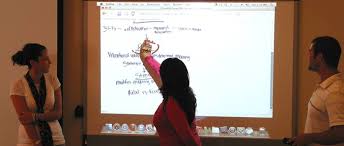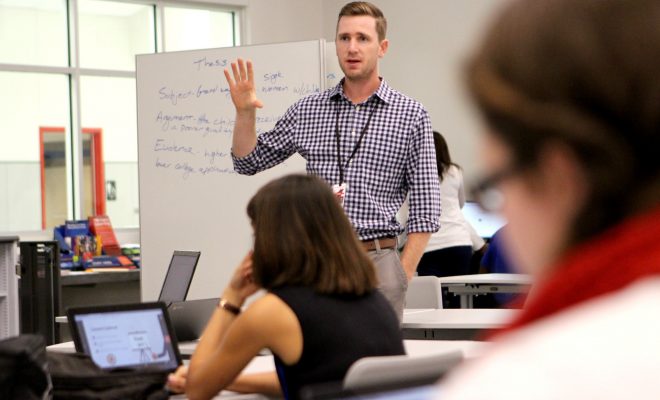Want more innovation? Try connecting the dots between engineering and humanities

Sophia Krzys Acord, University of Florida; Kevin S Jones, University of Florida, and Susan D Gillespie, University of Florida
_This article is a part of The Conversation’s series on unique courses. For other articles in this series, read here and here. _
Today’s college students may benefit from an exciting array of subjects to study. But they seem to miss the most important education of all: how to relate their specialization to others in an increasingly interconnected world.
The National Academy of Engineering has categorically stated that today’s engineers need to be more than individuals who simply “like math and science.” They must be “creative problem-solvers” who help “shape our future” by improving our “health, happiness, and safety.”
And in 2001, the engineering accreditation body ABET added a new criterion so as to ensure that students get “the broad education necessary to understand the impact of engineering solutions in a global, economic, environmental, and societal context.”
The point is that the connections between humanities and science have been lost in today’s separation of disciplines. Indeed, a recent report by the American Academy of Arts and Sciences discovered that humanities and STEM (Science, Technology, Engineering and Mathematics) training majors largely dwell in different silos.
So, where and how did we lose our way? And how can educators and institutions change things?
Separation of disciplines
The founders of the National Endowment for the Humanities (NEH) were well aware of the critical nature of this interdependence.
When the NEH and the National Science Foundation (NSF) were established in the 1950s and ‘60s, the NEH founders wrote:
If the interdependence of science and the humanities were more generally understood, men would be more likely to become masters of their technology and not its unthinking servants.
These founders, hailing from leading universities as well as the US Atomic Energy Commission, IBM Corp and New York Life Insurance, knew that connecting the humanities and sciences helps us make informed judgments about our control of nature, ourselves and our destiny.

Phillip Barron, CC BY-NC
But, since the 1980s, political rhetoric has emphasized the need for less humanities and more STEM education. STEM is painted as a more profitable investment, in terms of job creation and research dollars generated.
A notable example is the Obama administration’s “Race to the Top” initiative, which both isolates and prioritizes the STEM disciplines from the humanities, arts and social sciences.
This rhetoric is also evident in the creation of separate political education organizations such as the bipartisan STEM Education Caucus founded several years ago by congressional representatives to strengthen STEM education from kindergarten to the workforce.
This separation of disciplines actually hurts education, and it also hurts our ability to innovate and solve big problems.
Connecting STEM with humanities doesn’t just provide the well-rounded education today’s employers want. As the American Academy of Arts and Science’s 2013 “The Heart of the Matter” report observes, connecting these fields is necessary to solve the world’s biggest problems such as “the provision of clean air and water, food, health, energy, universal education, human rights, and the assurance of physical safety.”
So, separating and prioritizing STEM from humanities ignores the fact that we live in a complex social and cultural world. And many different disciplines must combine to address this world’s needs and challenges.
Bringing the disciplines together
To address this gap, four years ago the faculty from materials engineering and liberal arts at the University of Florida began working with the Materials Research Society. We wanted to put together a new course on “materials.”
Why did we choose materials? Because everything is made of them, every discipline studies them and they are tangible (quite literally) to the average freshman.

Internet Archive Book Images
After all, grade school students still learn about the Stone, Bronze, and Iron ages. The Industrial and Information revolutions revolved around new uses for steel, aluminum and silicon. The human past has been shaped by harnessing and consuming materials and energy.
Materials will be important for our collective future as well. So, we thought, this is the future for which we should be preparing students.
And thus our course, The Impact of Materials on Society (IMOS), was born. Taught by a team of nine faculty from engineering, humanities and social sciences, the course explores the close connection between the “stuff” in our lives and our experiences as social beings.
Students discuss how materials benefit global trade and communication but also risk resource exploitation and political conflict. For example, we depend upon rare earths for our cellphones, iPads and wind farms, but accessing these rare earths from limited sources is not sustainable.
So, some of the questions that the course raises are: what materials do we depend upon in our daily lives? Does this dependence have social consequences? What social relationships form around the production and use of these materials? And how do our current uses of materials affect our ability to discover new uses for them?

college.library, CC BY
Students are also asked to consider how our values shape our willingness to adopt new technologies. For example, Earl Tupper may have invented Tupperware, but it was Brownie Wise and her home parties with other women who first made his polymer famous!
Each week covers a different material (eg, clay, glass, gold, plastic), its scientific properties, demonstrations, and its past and present impacts.
Working together in multidisciplinary groups, students then contemplate the development of future materials. These include flexible electronic materials that can be used to create wearable sensors that can transmit important information, such as body hydration levels during athletic training. New polymer (plastic) materials made from renewable sources instead of petroleum may have fewer health risks and are more sustainable than today’s plastic cups and bottles.
At the same time, they discuss the ethical and social considerations that might affect the successful production and adoption of these new materials in different contexts.
Gap in education
The course is different from other freshman-oriented courses. It is not a “history course for engineers.” And it is not an “engineering course for humanists.”
It is an interdisciplinary course that uses multiple perspectives to understand materials innovation. A wide range of departments including engineering, anthropology, classics, history, English, sociology and philosophy participate in its teaching.
Students refer to IMOS as a “bridge course” that provides the “connecting dots” between different classes.
And the responses come from students across the different majors. For instance, one engineering major noted, “This class just further proves that you have to understand different aspects of how our world works and not just engineering to be a great engineer.”
Meanwhile a history major observed, “This class gives me a leg up in my other history courses because it reminds me to think about the properties of materials and how they shape our lives.”
These experiences point to a gaping hole in modern education: discipline-specific and general education courses provide important knowledge, but “bridging courses” are needed for students to capitalize upon that knowledge.
To engineer useful technologies, we need to connect scientific study with the cultural competencies of the humanities and social sciences.
Challenges of 21st-century learning
The “Renaissance” ideal was to produce elite men whose broad training prepared them for any endeavor. Thankfully, 21st-century education is more inclusive.
But it still requires intellectual and cognitive flexibility to harness large amounts of data.
This doesn’t mean simply knowing everything, even though we live in the “Age of Google.” Today, students need the ability to make connections across disciplines.
Celebrated innovators such as Einstein, Ada Lovelace and Steve Jobs credit the intersection of disciplines for their inventive thinking.
More boundary-crossing opportunities in higher education can break open the disciplinary silos. And that alone will unleash critical thinking and innovation.
![]() Additional contributors to this article are University of Florida faculty Sean Adams, Marsha Bryant, Florin Curta, Mary Ann Eaverly, Bonnie Effros and Ken Sassaman, and Materials Research Society Outreach Coordinator Pamela Hupp.
Additional contributors to this article are University of Florida faculty Sean Adams, Marsha Bryant, Florin Curta, Mary Ann Eaverly, Bonnie Effros and Ken Sassaman, and Materials Research Society Outreach Coordinator Pamela Hupp.
Sophia Krzys Acord, Associate Director, Center for the Humanities and the Public Sphere; Lecturer in Sociology and Criminology & Law, University of Florida; Kevin S Jones, Chair Professor, University of Florida, and Susan D Gillespie, Professor, University of Florida
This article was originally published on The Conversation. Read the original article.






